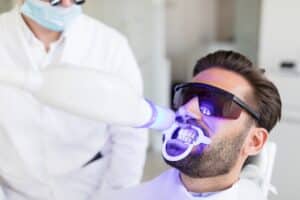It is not uncommon to develop periodontal gum disease as it happens to an estimated of 8 out of 10 people in the States. They can range from minor inflations and irritations to serious scenarios that may or may not prove fatal for your gums and even the bones in your mouth that are responsible for supporting the teeth. As a worst case scenario, teeth can be lost and may require artificial replacements for the entire set.

What is periodontal gum disease?
Periodontal diseases are most commonly caused by accumulation of bacteria and plaque in the mouth. Bacterial deposits are common as our mouths perform several functions that require interaction with external objects such as food and even breathing. If not cleaned regularly, this deposit can turn into tartar which cannot be cleaned out at home without a dentist appointment. If further left unchecked, the tartar leads to serious periodontal gum diseases.
How can it be avoided?
Periodontal diseases can be avoided with a little careful planning and regular treatments at your dental care professional.
- Brushing and flossing regularly and thoroughly can help clean out unwanted plaque accumulation. It is best to maintain good oral hygiene. Cleanliness is, after all, the best way to avoid diseases as a whole to an extent.
- Regular visits to your dental care professional can help keep your dental condition in check. This can be as simple as cleaning treatments to serious surgeries. However, the regularity will help in detecting most diseases early on and subsequently help prevent them or avoid them altogether.
- It is essential that we are aware of what goes into our mouth. That includes everything from regular meals, breath, soft drinks, to tobacco products and drugs. There are several medications, both prescribed and otherwise, that contribute to serious diseases. And it is essential to consume in moderation.
- If using dental appliances such as aligners, braces, or apnea treatment devices, it is crucial to keep them clean and bacteria free as they are required in your treatment. It would be disastrous if your course of treatment is responsible for worsening your condition. It is recommended to check your dental condition regularly for signs of possible infections.
- If already affected by periodontal disease, which can be identified by symptoms like persistent bad breath, bleeding gums, loose or sensitive teeth, and if chewing proves very painful.
Treatment of periodontal diseases

There are several possible treatment courses as would be prescribed by your dentist depending on your condition. Deep cleaning and root planing is a successful method of cleaning out plaque from typically inaccessible areas. Surgery and bone grafting are also recommended in cases where they are necessary. It is usually when the disease has reached a serious condition and can no longer be treated with conventional methods. Besides this, it can also be treated with medications. The best course of treatment also lies in a well balanced diet. It is imperative to keep your diet in check as deficiencies of certain nutrients are often the case for serious gum diseases. For best results, consult your dental care professional.




